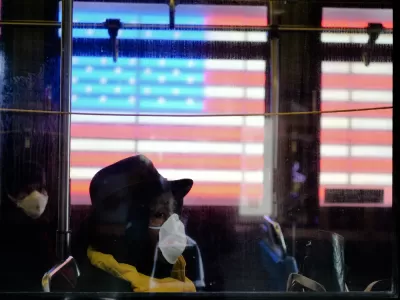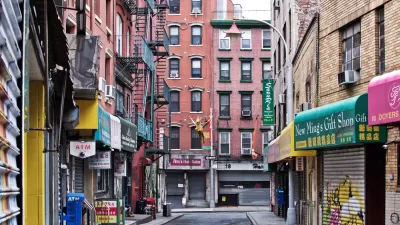The impact of coronavirus on unemployment and healthcare is predicted to affect black and Latinos at a disproportionate rate, raising questions about what can be done to ease the suffering and close the racial wealth divide in America.

Amidst dramatic spikes in unemployment and widespread loss of healthcare benefits, a result of the outbreak of the novel coronavirus, growing concerns mount over the severity of hardship experienced in communities of color.
“Government data shows the outbreak is more concentrated in major US metropolitan areas like New York City, New Orleans and the nation's southeast where greater percentages of black and Latino Americans live. In New York City, the virus is disproportionately affecting lower-income neighborhoods in Queens, Harlem and the Bronx, which have denser populations of immigrants of color, African Americans and Hispanics,” writes Chauncey Alcorn.
The impact in urban centers is echoed in the national labor market where those sectors taking the greatest financial hit disproportionately staff Black and Latino employees. Moreover, greater rates of underlying health conditions in Blacks, Latinos, and Native Americans compared to whites could mean an increased need for medical care, potentially resulting in medical debt and more difficult recovery.
To address the disproportionate impact of these financial and medical threats, the Senate-approved $2.2 trillion stimulus package is a start, but is not a sufficient remedy to the increasing racial wealth disparity, says the Institute for Policy Studies' "Inequality and the Common Good" program director, Chuck Collins. Providing financial support and helping Americans to avoid debt is the kind of intervention that could narrow the racial wealth gap, adds Collins.
FULL STORY: Why the coronavirus crisis will expand America's racial wealth gap

Planetizen Federal Action Tracker
A weekly monitor of how Trump’s orders and actions are impacting planners and planning in America.

Congressman Proposes Bill to Rename DC Metro “Trump Train”
The Make Autorail Great Again Act would withhold federal funding to the system until the Washington Metropolitan Area Transit Authority (WMATA), rebrands as the Washington Metropolitan Authority for Greater Access (WMAGA).

DARTSpace Platform Streamlines Dallas TOD Application Process
The Dallas transit agency hopes a shorter permitting timeline will boost transit-oriented development around rail stations.

Supreme Court Landlord Appeal Case Could Overturn Tenant Protections
A legal case claiming that COVID-era eviction moratoriums were unconstitutional could spell trouble for tenant protections.

Texas Moves to Curb Orphan Wells, But Critics Say Loopholes Remain
A proposed state law would shift financial responsibility for sealing unused drilling sites from the public to energy operators, though some advocates question its effectiveness due to industry-backed exemptions.

Affordable Housing Finance 101
The financial intricacies involved in building affordable housing can be difficult to understand. This explainer breaks down the foundational concepts.
Urban Design for Planners 1: Software Tools
This six-course series explores essential urban design concepts using open source software and equips planners with the tools they need to participate fully in the urban design process.
Planning for Universal Design
Learn the tools for implementing Universal Design in planning regulations.
Municipality of Princeton
Roanoke Valley-Alleghany Regional Commission
City of Mt Shasta
City of Camden Redevelopment Agency
City of Astoria
Transportation Research & Education Center (TREC) at Portland State University
US High Speed Rail Association
City of Camden Redevelopment Agency
Municipality of Princeton (NJ)





























